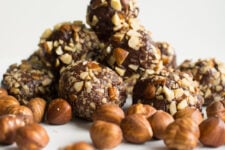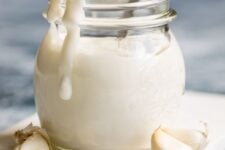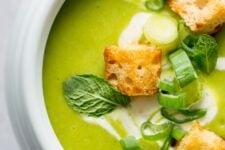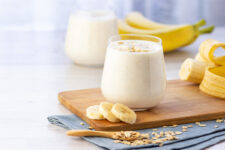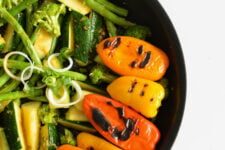If you’re vegan or vegetarian, you likely don’t think of avoiding animal products when you reach for a St. Patrick’s Day pint. Beer doesn’t contain any animal products or byproducts, right?
Well… that wasn’t (and isn’t!) always the case.

Guinness and Fish Guts
Turns out, everyone’s favorite Irish stout once contained a very interesting ingredient, at least back in the day. As Conde Nast Traveler reported in 2015, historically, Guinness Stout contained an ingredient known as isinglass.
According to JSTOR Daily, isinglass, also sometimes called “fish glue,” is a gelatin-like fish by-product traditionally used in all sorts of ways. In beer, as well as wine and hard cider, it’s used for clarifying the brew and removing fine particles. In other times and industries, isinglass was used in medicine, Romans would use it in magic tricks, and Medieval artists would use isinglass as glue in manuscripts. Even today, art conservators use it in restoration work.
Back in the world of food and drink, isinglass helped preserve eggs before pasteurization became a thing. It was also used how we use gelatin today.
Luckily, though, if you’re worried about trace bits of appetizing “fish glue” in your beer, you’ll be glad to know that Guinness stopped using isinglass in 2016, switching the historical clarifying agent for a more modern filtration system.
So if you’re a vegetarian planning to raise a pint of Guinness on St. Patrick’s Day (or even use it as an ingredient in a chocolate cake), feel free!

Do You Need to Worry About Whether or Not Your Beer is Vegan or Vegetarian?
So now that we’ve introduced you to isinglass in your Guinness, you might be wondering if you should worry about other brews and what mysterious ingredients might be lurking within. Turns out, beer isn’t always as straightforward as it seems.
Luckily, just as Guinness stopped using isinglass in 2016, so have a lot of other brewers. You may be able to find traditional brewers still using it, especially in Europe, but you don’t have to worry about most of the American brands that you find on tap today. Go ahead and have your Bud, Corona, or Sam Adams without a worry.
However, beyond isinglass, there are other animal by-products you might want to watch out for, though they’ll be easier to spot. Some brews contain honey for flavor, and others contain lactose. Most beers that contain these, though, will say so right on the label or in the name.
What About Wine?
You also, though, might’ve caught on that we did include wine in our list above, of items that traditionally included isinglass. Yes, not all wine is vegan and just made with grapes and a little love. Look out for isinglass, egg whites, and casein in your wine, if you’re vegan or otherwise avoiding animal by-products.
Vegan wine is becoming more of a trending option, though, so, to be safe and to avoid spending your valuable time searching down a wine ingredients list, just reach for a bottle that’s clearly marked vegan.


